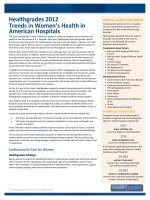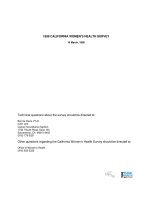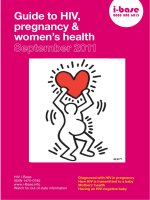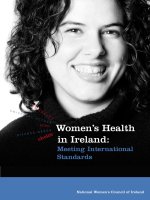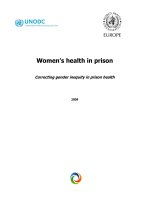ETHICAL GUIDELINES FOR ABORIGINAL WOMEN’S HEALTH RESEARCH docx
Bạn đang xem bản rút gọn của tài liệu. Xem và tải ngay bản đầy đủ của tài liệu tại đây (211.08 KB, 11 trang )
ETHICAL GUIDELINES FOR
ABORIGINAL WOMEN’S HEALTH RESEARCH
Saskatoon
Aboriginal Women’s Health
Research Committee
Prairie Women’s Health Centre of Excellence
Project #89
ETHICAL GUIDELINES FOR
ABORIGINAL WOMEN’S HEALTH RESEARCH
September 2004
Saskatoon Aboriginal Women’s Health Research Committee
Prairie Women’s Health Centre of Excellence
Prairie Women’s Health Centre of Excellence (PWHCE) is one of the Centres of Excellence for
Women’s Health, funded by the Women’s Health Contribution Program of Health Canada. The
PWHCE supports new knowledge and research on women’s health issues; and provides policy
advice, analysis and information to governments, health organizations and non-governmental
organizations. The views expressed herein do not necessarily represent the official policy of the
PWHCE or Health Canada.
The Prairie Women’s Health Centre of Excellence
56 The Promenade
Winnipeg, Manitoba R3B 3H9
Telephone (204) 982-6630 Fax (204) 982-6637
This report is also available on our website: www.pwhce.ca
This is project #89 of the Prairie Women’s Health Centre of Excellence
ISBN 0-9735048-6-2
Ethical Guidelines for Aboriginal Women’s Health Research
1
ETHICAL GUIDELINES FOR
ABORIGINAL WOMEN’S
HEALTH RESEARCH
These ethical guidelines for Aboriginal women’s health research were developed by the
Saskatoon Aboriginal Women’s Health Research Committee with support from Prairie
Women’s Health Centre of Excellence. The guidelines have been adapted from the Royal
Commission on Aboriginal Peoples – Ethical Guidelines for Research (1993)
1
and Ethical
Guidelines for WUNSKA Research. WUNSKA is a Cree word meaning, "To wake up"; these
guidelines were developed by a group of social workers in the early 1990s, in order to facilitate
research by and for Aboriginal people.
The need for these guidelines comes out of recognition of the historically detrimental
relationship between Aboriginal peoples and researchers and the research process. The
development of ethical guidelines by Aboriginal women will help toward creating relevant and
accurate research. The Saskatoon Aboriginal Women’s Health Research Committee developed
these guidelines for their own work and also to be used by other researchers.
These guidelines uphold the standard of best practice adopted by the Saskatoon Aboriginal
Women’s Health Research Committee. The guidelines were developed for use in two projects,
Naspici Miyomahcihowin: Continuous Good Health by the Saskatoon Aboriginal Women’s
Health Research Committee
2
and Living Well: Aboriginal Women, Cultural Identity and
Wellness
3
by Alex Wilson.
1
< />2
Saskatoon Aboriginal Women’s Health Research Committee. Naspici Miyomahcihowin: Continuous Good Health. Winnipeg: Prairie Women’s Health
Centre of Excellence, 2004. Available at <www.pwhce.ca>
3
Alex Wilson. Living Well: Aboriginal Women, Cultural Identity and Wellness. Winnipeg: Prairie Women’s Health Centre of Excellence, 2004.
Available at <www.pwhce.ca>
2
Ethical Guidelines for Aboriginal Women’s Health Research
Adapted from the Royal Commission on Aboriginal Peoples’
Ethical Guidelines for Research:
PURPOSE
These guidelines have been developed to help ensure that, in all research sponsored by the
Aboriginal Women’s Health Research Program, appropriate respect is given to the cultures,
languages, knowledge and values of Aboriginal peoples’ legitimate knowledge.
These guidelines represent the standard of best practice adopted by the Saskatoon Aboriginal
Women’s Health Research Advisory Committee.
PRINCIPLES
Aboriginal peoples have distinctive perspectives and understandings, deriving from their
cultures and histories and embodied in Aboriginal languages. Research that has Aboriginal
experience as its subject matter must reflect these perspectives and understandings.
In the past, research concerning Aboriginal peoples has usually been initiated outside the
Aboriginal community and carried out by non Aboriginal people. Aboriginal people have had
almost no opportunity to correct misinformation or to challenge ethnocentric and racist
interpretations. Consequently, the existing body of research, which normally provides a
reference point for new research, must be open to reassessment.
Knowledge that is transmitted orally in the cultures of Aboriginal peoples must be
acknowledged as a valuable research resource along with documentary and other sources. The
means of validating knowledge in the particular traditions under study should normally be
applied to establish authenticity of orally transmitted knowledge.
Ethical Guidelines for Aboriginal Women’s Health Research
3
In research portraying community life, the multiplicity of viewpoints present within Aboriginal
communities should be represented fairly, including viewpoints specific to age and gender
groups.
Researchers have an obligation to understand and observe the protocols concerning
communications within any Aboriginal community.
Researchers have an obligation to observe ethical and professional practices relevant to their
respective disciplines.
Researchers have an obligation to observe and respect a holistic philosophy in practice. This
includes the mental, physical, emotional and social well being of each person or groups
involved in research.
There shall be fair treatment of all persons participating in Aboriginal women’s health research.
GUIDELINES
•
Researchers shall conscientiously address themselves to the following questions:
•
Are there perspectives on the subject of inquiry that are distinctively Aboriginal?
•
What Aboriginal sources are appropriate to shed light on those perspectives?
•
Is proficiency in an Aboriginal language required to explore these perspectives and
sources?
•
Are there particular protocols or approaches required to access the relevant knowledge?
•
Does Aboriginal knowledge challenge in any way assumptions brought to the subject from
previous research?
4
Ethical Guidelines for Aboriginal Women’s Health Research
•
How will Aboriginal knowledge or perspectives portrayed in research produced be
validated?
•
How will all comments of participants be validated?
•
How will comments be recorded to ensure the context of the participant is portrayed?
Consent
Informed consent shall be obtained from all persons and groups participating in research.
Such consent may be given by individuals whose personal experience is being portrayed,
by groups in assembly, or by authorized representatives of communities or organizations.
Consent should ordinarily be obtained in writing.
Individuals or groups participating in research shall be provided with information about the
purpose and nature of the research activities, including expected benefits and risks.
No pressure or coercion shall be applied to induce participation in research.
Participants should be informed that they are free to withdraw from the research at any
time.
Participants should be informed of the degree of confidentiality that will be maintained in
the study.
Informed consent of parents or guardians and, where practical, of children should be
obtained in research involving children.
Ethical Guidelines for Aboriginal Women’s Health Research
5
Collaborative Research
In studies that are carried out in the general community and that are likely to affect
particular Aboriginal communities, consultation on planning, execution and evaluation of
results shall be sought through appropriate Aboriginal bodies.
In community-based studies, researchers shall ensure that a representative cross-section of
community experiences and perceptions is included.
The convening of the Aboriginal Women’s Health Research advisory group to provide
guidance on the conduct of research shall not pre-empt the procedures laid down in this
part but shall supplement them.
Review Procedures
Review of research results shall be solicited both in the Aboriginal community prior to
publication.
A cross-section of the participants of the study will be brought together to review the
document before publication.
Access to Research Results
Aboriginal Women’s Health Research shall maintain open public access to final reports of
research activities. Reports may be circulated in draft form, Aboriginal community
response at this stage is deemed useful for purposes of revision.
Results of community research shall be distributed as widely as possible within
participating communities, and reasonable efforts shall be made to present results in non
technical language and Aboriginal languages where appropriate.
6
Ethical Guidelines for Aboriginal Women’s Health Research
Community Benefit
In setting research priorities and objectives for community-based research, the Aboriginal
Women’s Health Research Advisory Council and the researchers shall give serious and due
consideration to the benefit of the community concerned.
In assessing community benefit, regard shall be given to the widest possible range of
community interests, whether the groups in question be Aboriginal or non Aboriginal, and
also to the impact of research at the local, regional or national level. Wherever possible,
conflicts between interests within the community should be identified and resolved in
advance of commencing the project. Researchers should be equipped to draw on a range of
problem-solving strategies to resolve such conflicts as may arise in the course of research.
Whenever possible research should support the transfer of skills to individuals and increase
the capacity of the community to manage its own research.
Implementation
These guidelines shall be included in all research that Aboriginal Women’s Health
Research initiates.
It shall be the responsibility, in the first instance, of all researchers to observe these
guidelines to monitor the implementation of the guidelines and to make decisions regarding
their interpretation and application.
Where, in the opinion of the Aboriginal Women’s Health Research or the research team,
the nature of the research or local circumstances make these guidelines or any part of them
inapplicable, such exception shall be reported to the Research Coordinator, and the
exception shall be noted in the research contract or contract amendments as well as in any
publication resulting from the research.
Ethical Guidelines for Aboriginal Women’s Health Research
7
Adapted from the Ethical Guidelines for WUNSKA Research
PRINCIPLES OF THE RESEARCH LEARNING CIRCLE
We strive to live in harmony with one another and with all creation around us in this circle of
life. In a circle no one is above another. There is a sense of belonging to a family and to a
community.
These are the principles that the researchers will follow in terms of how they conduct
themselves.
The Fifteen Poles represent the Following Values:
1.
Obedience
We learn by listening to traditional stories; by listening to our parents or guardians, our
fellow students and our teachers. We learn by their behaviours and their reminders, so that
we know what is right and what is wrong.
2.
Respect
We must give honour to our Elders and fellow students, and the strangers who come to visit
our community. We must honour other peoples’ basic rights.
3.
Humility
We are not above or below others in the circle of life. We feel humbled when we understand
our relationship with Creation. We are so small compared to the majestic expanse of
Creation. “We are just a strand in a web of life” and we respect and value life.
8
Ethical Guidelines for Aboriginal Women’s Health Research
4.
Happiness
We must show some enthusiasm to encourage others at social functions. Our actions will
make our ancestors happy in the next world.
5.
Love
If we are to live in harmony we must accept one another as we are and to accept others who
are not in our circle. Love means to be kind and good to one another.
6.
Faith
We must learn to believe and trust others, to believe in a power greater than ourselves
whom we worship and who gives us strength to be a worthy member of the human race.
7.
Kinship
Our family is important to us. This includes our parents, our brothers and sisters who love
us and gives us roots, the roots that tie us to the lifeblood of the earth. It also includes
extended family; grandparents, aunts, uncles, and cousins and their in-laws and children.
These are also our brothers and sisters and they give us a sense of belonging to a
community.
8.
Cleanliness
We must learn not to inflict ills on others, for we do it to ourselves. Clean thoughts come
from a clean mind and this comes from Indian spirituality. Good habits also reflect a clean
mind.
9.
Thankfulness
We learn to give thanks for all the kind things others do for us and for the Creator’s bounty,
that we are privileged to share with others in the spirit of love.
Ethical Guidelines for Aboriginal Women’s Health Research
9
10.
Sharing
We learn to be part of the family by helping in providing food or other basic needs. This is
sharing responsibilities in order to enjoy them.
11.
Strength
We must learn to be patient in times of trouble and not to complain but endure and show
understanding. We must accept difficulties and tragedies so that we may give others
strength to accept their own difficulties and tragedies.
12.
Good Child Rearing
Children are unique and blessed with the gift of life. We are responsible for their well-
being, spirituality, emotional, physical, and intellectual development. They represent the
continuity of our circle of life which we perceive to be the creator’s will.
13.
Hope
We must hope for better things to make life easier for us, our family and the community,
both materially and spiritually.
14.
Ultimate Protection
The ultimate responsibility to achieve is “health for a balanced caring for the body, mind,
emotions, and the spirit of the individual, the family, the community and the nation.”
15.
Control Flaps
We are connected by relationships and we depend on each other. This controls and creates
harmony in the circle of life.

